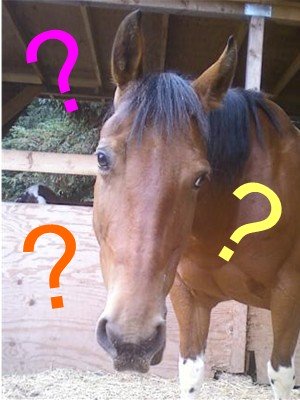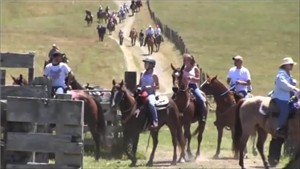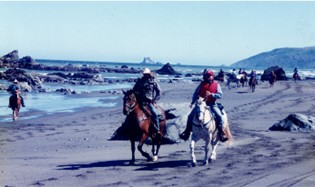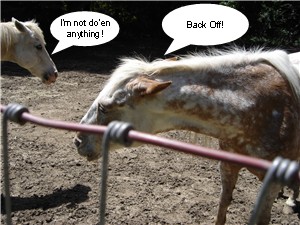Buying a Horse - A How-to Guide
Avoid Getting 'Suckered' and Find Your Perfect Match
Are you considering buying a horse? Don’t know where to start? Learn how to protect yourself from dishonest horse sellers and feel confident in your purchase.
Whether you are getting you’re first horse or your third, you’ll want to make the best purchase possible for you and your family. Here’s how.
Before Buying a Horse
Ask yourself, how you will be using your horse. What type of riding you plan on doing will play a major role in the type of horse you will need. If you plan on competing in a physically demanding sport like barrel racing, hunter jumping or endurance riding you’ll want to consider the horse’s age and breed.
If you are looking at something you can pleasure ride with in less demanding arena work, parading or trail riding, age and breed won’t matter so much.
Do Papers Matter?
Papers refer to a horse that is officially registered with their ‘Breed Registry’. The horse will be given a unique identification number. The papers will show the animal’s name, I.D. number and bloodline ancestry of the horse. When a papered horse is sold, the papers must go with it. The new owner can then register the horse in their name.
Is it better or necessary to buy a papered horse? That depends on what you are planning to do with it. If you are in the equine breeding business, it is essential. Papers may be required to compete on a professional level in certain events, like jumping or horse racing.
Some people just like the idea of knowing that they own a ‘pure bred’ horse or they feel the horse may have a higher resale value. Do they? Not necessarily. There are too many factors involved to make that assumption. When buying a horse you must determine how important having a papered horse is to you.
You don’t ride the papers…you ride the horse.
A well-bred, papered horse that is too ill-mannered or untrained for you to ride is no fun. Remember, just because a horse is papered, doesn't mean he is well trained. If he is well behaved and he has papers to boot, that’s just icing on the cake!

Buying a Horse - How Much Should I Pay?
If you are looking for a good, solid, broke to ride pleasure horse expect to pay $800-$3500. The more training a horse has, the higher the price.
If you plan on buying a horse that can go from 0-60 in 1.5 seconds and is a proven Jr. Rodeo winner, or a Warmblood with advanced dressage training, expect to pay a whole lot more.
Not everyone who owns a paint brush is an artist.
Remember, horses that are very highly trained often will get frustrated with an inexperienced rider at the reins. Unless you are under the tutelage of a good trainer you may not be able to make good use of all that training and you very well might 'ruin' a very good horse.
Your money might be better spent on a horse that just has a lot of solid experience under saddle and is a reliable mount. Another thing...just because a horse has a high price tag does not mean it’s a good solid horse. Dishonest sellers will be counting on you to make that assumption!
Before Buying a Horse Get Your Priorities Straight
Be honest with yourself when you are horse shopping. Don’t buy more horse than you can handle. That is a disaster waiting to happen and almost never turns out well. If you are a beginner stay away from:
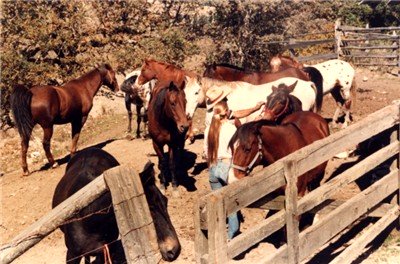
- Young horses (less than 10 yrs)
- Green broke or 'started under saddle' (very little time under saddle)
- Halter broke (no time under saddle!)
- Stallions
- Horses advertised as ‘Needs Experienced/Confident rider’
When you are buying a horse, don’t get overly concerned with a horse’s sex, age, breed or color. Yes geldings do tend to be less ‘moody’ than mares, BUT that is NOT a hard-and-fast rule. There are plenty of ill-behaved geldings and well-behaved mares out there. Each horse must be evaluated individually.
Color does NOT matter. Better to concern yourself with things like straight legs, good feet and an even temperament.
There is no bad color for a good horse.
Don’t pooh-pooh older horses. Newbies often put the words ‘old’ and ‘nag’ together as if older horses are something to be ashamed of and avoided. Nothing could be further from the truth. The level of life experience and training that older horses have to offer is worth its weight in GOLD.
By the same token, just because a horse is older, don’t assume it’s a well-broke sweetheart that you can put your grandkids on. Horses can be ill-mannered at any age!
Unless you are buying a horse to compete in a very specific sporting event, don’t place too much emphasis on breed. There are great hoses in every breed and awful horses in every breed. Take it one horse at a time.

Should I Be Buying a Horse or a Pony for my Child?
It is more important to match your child to a horse based on their riding skill than the size of the animal. Regardless of size, you should only buy an animal that you really trust to carry a child.

Advantages of a Pony
- Children feel less threatened by their size.
- A pony is short enough that a child can saddle them.
- They eat less than horses.
- Ponies tend to have tougher feet than horses, allowing them to go barefoot.
- Ponies are smart.
Disadvantages of a Pony
- Kids outgrow ponies.
- Ponies have to ‘trot’ and hurry to keep up with long-legged horses on the trail.
- A child mounted on a pony is placed closer to bigger horses' ‘kick zones’ when riding in groups.
- Many ponies misbehave because adults don’t ride them and inexperienced kids do.
- Ponies tend to be feistier than horses.
- Ponies are smart - They can outsmart children.

Buying a Horse – Where to Find a Good One
A ‘good’ horse is a horse that fits your needs! What is good for one person is not good for another. Once you have an idea of what you want out of a horse, you can begin shopping.
By far, the best way to find a horse is through word of mouth. Start asking around and put the word out into the horse community that you are looking for a horse. Who are people in the horse community?
- Horse trainers
- People who give lessons
- Friends with horses
- Farriers
- Horse club members
- Folks boarding horses at the local stables
- Large-animal vets
- Horse rescue volunteers
If you don’t know anyone, this is a very good time to jump in and get involved. Join a horse club. Volunteer to help out with your local horse 4-H or large animal rescue. Horse ownership is not a prerequisite. Take some riding lessons. Hang around the barn. Ask lots of questions. Ask someone if you can be present next time the farrier comes out. Walk into the large animal vet office and ask around. Let everyone know you are interested in buying a horse.
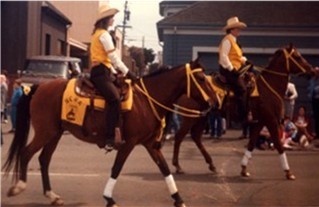
Often times these people will know of horses that are for sale or ‘looking for a new home’ but are not being advertised. These are the best leads to follow. These people are often familiar with the horse and can tell you a bit about its behavior and whether or not it might be a good match to your skill level. Because they have no personal interest in the deal, you’re more likely to get an honest review, before buying the horse.
The more you can learn about a horse’s background and history the better informed decision you can make. Try to find out:
- How the horse has been used: show ring, barrel racing, trail riding, etc.
- Any history of lameness
- Why is he being sold
- Has anyone witnessed the horse misbehaving? Bucking, rearing, etc.
Start checking the ads on your local craigslist under the ‘farm and garden’ section. You will see tons of horses advertised here. But before you get all excited about buying a horse…we need to address the subject of 'horse dealers' and cheats.


Use Caution When Buying a Horse on Craigslist/Internet
Don’t get me wrong. There are a lot of wonderful people selling wonderful animals on craigslist. But I’m not here to talk about them. I’m here to talk about distressed sellers and the lowest of the low….dirty rotten horse traders.
Distressed Sellers
Tip: When you are horse shopping, take someone knowledgeable with you. A second opinion from a horse-savvy friend is priceless.
Distressed sellers are often those people who did not do their homework before buying a horse. They are suffering from buyer’s remorse. They bought the animal, only to find out:
- The horse is too much for them to handle
- The horse has a serious lameness/health issue they did not know about
- The horse has a dangerous vice, like rearing or biting
Red Flag Warning: The seller has owned the horse for a very short period of time. Remember, people tend to hang on to good horses!
All they want to do it get rid of it and get their money back as soon as possible. They are not likely to tell you any of the ‘bad’ things about the horse. How can you spot these people? Usually they have owned the horse for a short period of time…anywhere from 2 weeks to a year.
The less time they have owned it, the more wary you should be. Another telltale sign is that they have not been riding or using the horse. Find out why. Ask them about the horse's history, where they bought it and why they are selling it. Listen closely to the answers.

Dishonest Horse Traders
Dishonest horse traders are easier to spot if you know what to look for. Start by scanning your local craigslist ads over several weeks time. You will begin to notice that the same person(s) always have a different horse for sale. They may have several horses for sale at any given time.
You will begin to recognize their ad writing style and even start to recognize the same surroundings in the photos they post. They often don’t show their face in the photos. You will notice that they post ads in your area and surrounding areas very regularly.
You will begin to notice that every single horse they have for sale is completely sound and perfect in every way…how amazing!!!!
When buying a horse be on the look-out for fantastic claims:
- Dead broke
- Bomb proof
- Kid safe
- Dog gentle
- Been there, Done that
- All this… and the horse is only 5 years old!!!! Oh boy…
Sometimes a horse trader’s ads are not so easy to spot at first glance. That’s why you want to make a habit of checking the ads regularly, so you can learn to spot them out before buying a horse off craigslist. These are real ads from a proven horse trader of the worst kind. Notice this person uses the same writing style in each ad:
Beautiful Big black paso fino pony :) - $1800 what a Beauty she is, and sweet little horse! She is very broke, neckreins, fun to ride, recommend intermediate rider and she likes gymkanas and is not a dead head,,, smooth gates, trailers great, Been there type of girl,, email for addiotional info.. thanks for looking
Very broke arbian gelding - $1200 Very nice Arabian gelding… Blaze is 10 years old, not he typical spunky Arabian..This guy has a gret mind! He turns on a dime, very easy to control, great stop,,,NO buck, rear, bite kick.. High ties gret, stands great for the farrier, utd on shots & worming, would make a great horse for beginner & up! 100% sound..email for additional info
Super broke buckskin mare -$1000 Very broke 11 yr old mare…Prancy @ first,,fun to ride!!! No buck, bolt, kick, buck,,,super sweet easy to catch..neckreins awesome..email for more info..

A Dishonest Horse Trader is Worse than a Used Car Salesman!
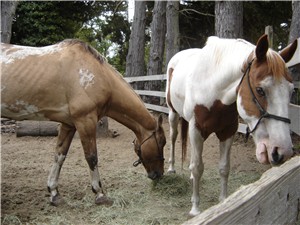 Underfed horses in poor conditions
Underfed horses in poor conditionsThey are underhanded salesmen in the truest sense. They will tell you anything and everything you want to hear whether it is true or not without batting an eye. For them it’s all about the money. They could care less about your safety or the horse’s well-being.
They have been known to use some very foul tricks to talk you into buying a horse from them:
- Drug the horse to mask bad behavior
- Drug the horse to mask pain and lameness
- Starve a rank horse until it is too weak to misbehave and then tell you they ‘rescued’ it from bad owners; and with a little feed, you can bring it back to its full potential!
- Outright lie about dangerous vices (biting, kicking, striking, rearing, etc.)
- Outright lie about the horse’s background, age, experience, and training level
- Some of them will even stoop so low as to put their own children on them to convince you the horse is ‘kid safe’
About Rescue Horses
If you buy a ‘rescue’ horse…get it from a legitimate large animal rescue organization. They will see to it that each horse is legitimately placed with a well matched rider/home.
Red-flag warnings to look for:
- They always have a horse for sale
- They haven’t owned the horse for long
- They have no medical history with the horse at the vet’s office (ask and verify with a phone call)
- The horse(s) are kept in poor conditions
- They try to pressure you into buying a horse 'right now'…after all …several others have called about the horse and are very interested in it…..yeah right!
- They have just rescued the horse and are looking for a good home for it!
- Tell you the horse is papered yet fail to produce the papers
- They have easy access to a horse auction facility (steady supply of horses to flip)
And the Biggest Red Flag Of all:
- They refuse to let you have a ‘trial period’ with the horse!
People trying to ‘get rid’ of horses often have something else in common. They have an incredible lack of interest in you. It’s the questions that they don’t ask that should cause you to raise an eyebrow. You will notice that no matter how inexperienced you are or how poor your own horse keeping facilities may or may not be, they are more than happy to sell you a horse anyway.
Honest sellers that have ridden, loved and cared for the animal will be very interested your horse keeping credentials. They want to feel confident that their horse is going to a safe, happy environment. They will be sizing you up and down as a potential owner as much as you are sizing their horse up and down as a potential purchase! Expect it.

How to Protect Yourself When Buying a Horse
Unquestionably, the number one way to protect yourself from dishonest/distresses sellers is to take the horse on a trial period before you make the purchase. This is also the best, surefire way to assure that you are truly finding your perfect equine match!
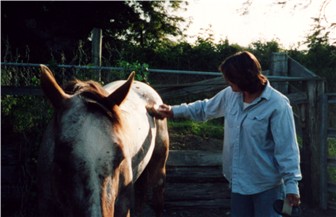
A trail period is when you take the horse home with you (before buying the horse) for a given period of time. You would not purchase a car without a test drive, nor should you with a horse. This is your chance for a complete and thorough 'test drive'.
Try to get a 30 day trial period. Don’t accept less than two weeks. If the seller refuses a trial period…walk away….no matter the excuse or reason for not doing a trial period…walk away.
If the seller doesn't trust you to properly care for the horse on a trial, why would they sell it to you? A seller that is truly interested in placing the horse in a good home will welcome a trial period. They will be just as interested in a good match as you are.
IMPORTANT Note About Trial Periods
Always write up a trial period agreement to be signed by both parties. This protects buyer, seller and horse. Buy locally if you can. It's much easier to conduct trial periods with local horses. Example of a trial agreement.
Why take a trial period as opposed to just riding the horse a few times before you buy it?
- Because the horse might be drugged
- Because the horse might behave just fine in the arena and then flip-out on the trail
- Because you may find out the horse jumps fences and you can’t keep him in your pasture
- Because you will want to have more time get to know the horse before making such an important decision
- Because you’ll want to be sure the horse is a good match for you before you spend your money on a vet check
Use your trial period time wisely. Take advantage of this time to get to know as much about the horse as is possible. Ride him. Expose the animal to as many different situations as you possibly can.
How does the horse behave with grooming, saddling, under saddle, on the trail, with traffic, in the arena, around dogs, with the farrier, trailering, with new pasture mates?...Test, test, test.
Unlike a dishonest trader, an honest seller will want to see where the horse will be kept. They will show interest in the horse and ‘call in’ just to check up. They will often invite you to meet them during your trial period to go riding together so they can see how you and the horse are working out.
They will be pleased in knowing that they have matched their beloved horse with the right owner…You. This leads me to my next point…

Before Buying a Horse – Get a Vet Check
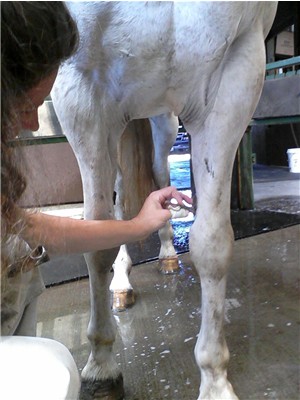
If the horse is working out well and you are pleased with what you see, then you can feel good about spending money for a vet check on a horse that you do not own yet.
What is a vet check? It's a pre-purchase veterinary examination preformed on behalf of the buyer. The sole purpose for a vet check is to see if the horse you are interested in buying is suitable (from a health perspective) for your intended use.
This is a very specific exam for lameness, flexibility, eyesight, heart/lung, teeth, hoof and general over all health and soundness of the horse. The vet will also verify the animals age.
If the horse has arthritis, founder, bog spavins, recurrent uveitis (leading cause of blindness), navicular disease or any other health issue, they will find it. They will also be able to tell you if the horse is prone to any lameness because of conformation (the way the horse is built).
The information that you get from a vet check is your way of knowing if the horse is up to the job you have in mind. Realize that a horse that is not sound enough for jumping may be perfectly suitable for Western Pleasure in the show ring.
I highly recommend you get a vet check before buying a horse. You can rule out the horse having been drugged by a cheat. And the vet can spot health problems that were not disclosed or perhaps known about by the seller.
Ask for a 'Pre-purchase Vet Check"
An average Vet check will cost $200-300. Call for local prices in your area.
If the vet finds any health problems, then you can determine at that point if it is a deal-breaker or not. If it is not a deal-breaker for you, you can use this new information to haggle a bit on the purchase price. That's up to you.
Buying a horse, and making a sound purchase, is all about arming yourself with knowledge and doing your due diligence. It is very well worth the effort. Some say "buyer beware", I say "Buyer be Smart!"
Other Articles You Might Enjoy:
Home > First Horse & Beyond > Buying a Horse
